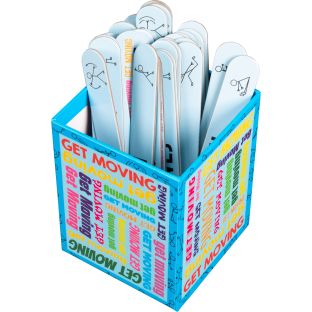Sensory – Preschool
Popular Preschool Sensory Materials
Inspire engagement with popular Preschool Sensory Materials. Our most-purchased Preschool Sensory Materials are versatile and appropriate in most school environments.
Really Good Stuff’s top Preschool Sensory Materials enhance experiences for students as well as teachers. Shop our most popular Sensory Materials for educators.
Preschool Sensory Products
Top-Rated Preschool Sensory Materials | 2025 School Year
Get top-rated Preschool Sensory Materials from Really Good Stuff. Teachers rate these 8 Sensory Materials with an average of 4.9 stars, making them the best Sensory Materials.
Explore these Preschool Sensory Materials loved by students aged 1 to 11 years-old. Through premium Preschool supplies, Sensory Materials can help your PreK grade to 8th grade class.
Shop Sensory Materials by Category
Learn More About Preschool Sensory Materials
Enhance your Preschool classroom with Really Good Stuff’s Sensory Materials. Our catalog of 67 high-quality Sensory Materials start at $3.59 and fit the Preschool classroom. From premium brands like Really Good Stuff®, Excellerations®, and Play Visions®, these Sensory Materials meet the needs of Preschool teachers.
Really Good Stuff’s Sensory Materials for Preschool students work for ages 0 to 4 and for grades Newborn to PreK. Teachers match Preschool Sensory Materials with other Sensory Materials from the Social-Emotional Learning category.
Make Really Good Stuff your top choice when looking for Sensory Materials for your Preschool classroom.
Creating a sensory-rich environment in a Preschool classroom can be incredibly beneficial for young learners. Sensory play helps children to develop critical skills, from fine motor abilities to social interaction. Teachers often use sensory products such as tactile bins filled with rice or sand, water tables, and textured mats to engage students’ senses. These tools encourage exploration and inquiry, promote calmness, and can be particularly useful for children with special needs. Integrating sensory activities into daily routines also helps to establish a more inclusive classroom where every child can discover and grow at their own pace.
When selecting sensory products for your Preschool classroom, there are a few key considerations to keep in mind. First, choose items that are developmentally appropriate and safe for young children. Products should be durable and free from small parts that could pose a choking hazard. Secondly, consider versatility. Opt for sensory tools that can be used in multiple ways to support different areas of learning, whether it’s cognitive development, emotional regulation, or social skills. Third, factor in ease of cleaning and maintenance. Since young children tend to be quite messy, having sensory items that can be easily cleaned will save you time and effort in the long run.
Preschool classrooms typically serve children ranging from ages 3 to 5, so it’s crucial to find sensory products that cater specifically to this age group. Younger students at this stage are just beginning to fine-tune their sensory processing skills, so offering them a diverse array of textures, scents, sounds, and visual stimuli can make a significant impact on their development. When buying sensory products for Preschool, it’s important to differentiate between the needs of this age group and those of older students. Younger children require more guided and safe exploration, whereas older kids can handle more complex sensory tasks. Keeping these distinctions in mind will help you to create the most effective and engaging sensory experiences for your Preschool classroom.
FAQs for Preschool Sensory Materials
What are the highest rated Preschool Sensory Materials?
- Excellerations® LED Light and Bright Panel (5 stars) – $142.99
- Really Good Stuff® Fidget Twists™ – Set of 10 (5 stars) – $42.99
- Colorations® Shapes and Numbers Dough Stampers Set of 26 (5 stars) – $39.99
What Preschool Sensory Materials do teachers use most?
- Really Good Stuff® Calm Down Tools – 6 tools and storage bin (4.5 stars) – $39.99
- Really Good Stuff® Sensory Strips Variety Pack – Set of Four – $20.99
- Really Good Stuff® Breathing Star Tactile Cards – 6 cards (5 stars) – $9.99
Which products can teachers use with Preschool Sensory Materials?
- Bouncy Bands® Sensory Fidget Plush Toys – Set of 2 – $69.28
- Bumpas Weighted Plush – Lucky – $39.99
- Bumpas Weighted Plush – Shin Shin – $39.99
Can you recommend some budget-friendly Preschool Sensory Materials?
- Really Good Stuff® Fidget Twists™ – Set of 10 (5 stars) – $42.99
- Colorations® Shapes and Numbers Dough Stampers Set of 26 (5 stars) – $39.99
- Really Good Stuff® Breathing Star 2-Pocket Folders – 12 folders (5 stars) – $20.99

























